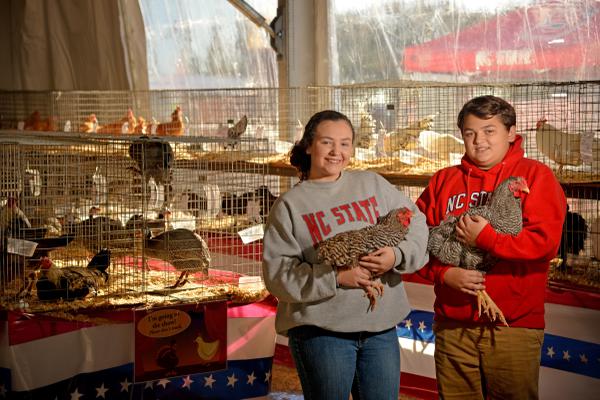General Information
Have you ever wondered what to do with all the chicks at the end of a 4-H embryology program? One option is to collaborate with youth groups based at schools, 4-H, or Future Farmers of America to raise and harvest the chickens for donation to local food pantries. This model provides educational opportunities for students in the embryology program, as well as for youth groups that raise the chickens. Inviting a mobile poultry processing unit on harvest day provides another educational opportunity for students and area farmers who want to learn more about safe slaughtering processes. It is important to plan the program, and especially the harvest day, well in advance in order to ensure that the timing is right—to coordinate with the food pantries, to avoid the summer heat, and to make sure there are sufficient volunteers. The entire process must follow strict food safety regulations. Raising the previously unutilized hatchlings produced during the embryology curriculum allows this resource to be fully appreciated by providing educational opportunities and by providing a valuable food source for local families.
|
Success Story “The goal of our program is to involve as many youth as possible to learn about all aspects of poultry production and processing. They learn how to raise chicks and make connections to better understand where our food comes from.” Extension Agent Some N.C. Cooperative Extension agents have developed a program that provides local pantries with chicken meat that has been raised by youth participating in 4-H, Future Farmers of America (FFA), and agricultural education classes. This program merges two programs: the 4-H elementary school embryology curriculum and the animal science curriculum for agricultural education students. Eggs are hatched by second-graders as part of their 4-H embryology studies to help them learn about a chicken’s life cycle. In this program, the chicks are then raised by youth who are learning about animal science. For those youth who are part of agricultural education through a high school, the school provides chicken feed, and teachers supervise the students as they raise the chicks for an additional six to eight weeks. All youth in the program are invited to show the chickens as part of a regional youth Chicken Show. The birds are then harvested in order to donate their meat to local food security organizations. When it comes time to process the birds, the event is turned into a training activity for participating students, local farmers, and community members. The Prestage Poultry Department at North Carolina State University brings a mobile processing unit to provide training on how to process chickens. Poultry inspectors from the NC Department of Agriculture & Consumer Services provide information to the farmers, and specialists from NC State provide training to farmers and the participating students throughout the process. Typically, 70 to 100 chickens are processed and donated to local food pantries through this program, with an additional 100 chickens processed in a similar model in a nearby county, although agents recommend starting small. Live chicken biosecurity, animal welfare, and food safety of the meat are major priorities of the event, and the Extension team follows best management practices. For more information, see On-Farm Processing Poultry: Tips for Safe Poultry Handling. The processing date is coordinated with food pantries that don’t have refrigeration or freezer space so that the fresh meat is available on the one day per month that the food pantries are open. Extension agents work with the food pantries and volunteers to ensure that the meat is kept at the right temperature until it is distributed, often relying on donated ice and coolers that are borrowed from a local company. |
How Cooperative Extension Can Be Involved
- Youth Education. This program provides educational opportunities for youth of many ages, from second-graders learning about embryology through high school students working to raise and show chickens.
- Training. Turning harvest day into a community-wide educational event provides additional training opportunities for local farmers and youth.
- Food Safety Education. Food safety plays a key role in this program at every stage, ensuring the health and welfare of the chickens throughout their life cycle and during the harvest process. It also includes safe handling practices of the meat.
Additional Resources
- For more information about this program, please contact Dr. Dara Bloom at dara_bloom@ncsu.edu.
- For more information about raising and processing poultry, including information about mobile processing units, please contact your local livestock agent. For additional help with husbandry questions, understanding the small flock processing exemption, assistance with basic equipment needs and setup, and some training in processing, please contact your area specialized agent for poultry.
- Several companies sell mobile poultry processing units. Two examples are Featherman Equipment and CCOnly.com.
- For information about how to safely process poultry, please consult the NC Choices resource: On-Farm Processing Poultry: Tips for Safe Poultry Handling.
Publication date: Nov. 8, 2017
LF-15
Other Publications in Farm to Food Bank Resource Guide for North Carolina Cooperative Extension
- Introduction: Food Banks and Food Pantries
- Direct to Food Bank and Food Pantry Donations
- Gleaning
- Venison Donation Programs
- Master Gardener Volunteers and Community / Home Gardens
- Food Pantry Produce Markets
- 4-H Chicken Donation: Embryology to Harvesting
The use of brand names in this publication does not imply endorsement by NC State University or N.C. A&T State University of the products or services named nor discrimination against similar products or services not mentioned.
N.C. Cooperative Extension prohibits discrimination and harassment regardless of age, color, disability, family and marital status, gender identity, national origin, political beliefs, race, religion, sex (including pregnancy), sexual orientation and veteran status.


